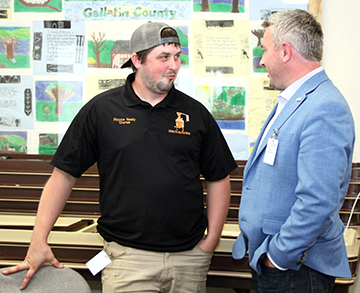SEPT
Moonshine (and Bourbon) in the Sunshine
Neeley Family Distillery Honors Its Family's Colorful History
By CHRIS ALDRIDGE, Kentucky Agricultural News
SPARTA, Ky. (Sept. 30, 2019) — For 11 generations, Royce Neeley’s family has been distilling whiskey – “most of it illegally,” he admitted, smiling.
But the family’s moonshine still, once concealed in the wooded hollers of Owsley County, now operates openly and legally in Gallatin County. Royce and his father opened Neeley Family Distillery, a Kentucky Proud member, two years ago outside the South Entrance of the Kentucky Speedway.
“There’s a big connection between whiskey and NASCAR – that’s how it was founded,” Royce said, noting the first NASCAR races featured regular cars souped up by bootleggers to outrun police cars. “History is very important to us.”
The distillery showcases 11 generations of Neeley distilling with family photographs, news articles, and artifacts, including a 100-year-old family still from the mountains.
Royce, 27, said to be the youngest distillery owner in the world, is also the lead distiller for Neeley Family Distillery in the production of bourbon and moonshine using old family recipes handed down for generations.
“In Owsley County, we can trace our family all the way back to 1840,” Royce said. “They moved south right after the Whiskey Rebellion.”
The rebellion was a protest in western Pennsylvania that started in 1791 when the newly formed federal government imposed a “whiskey tax” on farmers accustomed to distilling their surplus rye, barley, wheat, and corn. In 1794, President George Washington led an army of 13,000 militiamen to suppress the uprising by 600 armed farmers without firing a shot.
“They [farmers] had just fought a war over taxes,” Royce said of the Revolutionary War with Great Britain, in which one of the issues was taxation without representation. “Many of them moved south to the isolated mountains of eastern Kentucky to get away from the tax man.
“Distilling was a way of life on the farm back then. The only way to preserve leftover grain was mash it and distill it. Most all small farms in eastern Kentucky had a small still on them. Some of it [whiskey] was used for medicinal purposes.”
From 1794 to 1800, more than 175 distillers from Kentucky were convicted of not paying the whiskey tax, according to the book “The Alcoholic Republic: An American Tradition.” But the book notes that most distillers in the Commonwealth were all but impossible to tax.
In 1988, Royce’s dad moved his family from Owsley County to a 70-acre farm in Owen County because he “wanted to get away from a lot of the [illegal] stuff still going on there.”
“We joke about it now that, ‘Here we are, back in the whiskey business again,’” Royce said.
The Neeleys grew tobacco on their farm for many years. Now it’s going to support a new crop.
“We’re about to grow some heirloom corn on it and make it into whiskey. Bloody Butcher corn has a great taste to it,” said Royce, who holds a chemistry degree from Transylvania University.
The Neeleys distill 260,000 pounds of corn sourced from five different farmers in central Kentucky. They also buy nearly 50,000 pounds of Kentucky-grown wheat and rye.
“The only grain we don’t get in Kentucky is our malted barley because there are no malting houses here in Kentucky,” Royce said.
The Neeleys’ craft distillery produces two 53-gallon barrels of whiskey per day. Bigger Kentucky distillers such as Jim Beam and Buffalo Trace churn out 1,300 to 1,500 barrels a day.
Neeley Family Distillery is one of 20 stops on the Kentucky Bourbon Trail Craft Tour for those making fewer than 1,000 barrels per year.
“Ninety-eight percent of our visitors are from outside the county, and 60 percent of those are from out of state,” Royce said. “We had over 20,000 people come through our first year [in 2017], and it’s definitely grown since then.
“It [bourbon tourism] brings in a lot of outside money. Our average customer buys two bottles and takes the [$10 distillery] tour.”
In addition to the bourbon boom, Royce is also participating in another burgeoning industry in Kentucky – industrial hemp. The distillery has the equipment to turn hemp buds into Bluegrass Special CBD oil.
“My best friend five miles down the road, Taylor Jones, grows a lot of hemp,” Royce said. “We’re just a couple of young entrepreneurs, and we’re doing well with it.”
To find out more about Neeley Family Distillery, go to neeleyfamilydistillery.com.
Royce Neeley, left, chats with Agriculture Commissioner Ryan Quarles at the LAND (Linking Agriculture for Networking & Development) Forum in Warsaw in July. (Kentucky Department of Agriculture photo)


